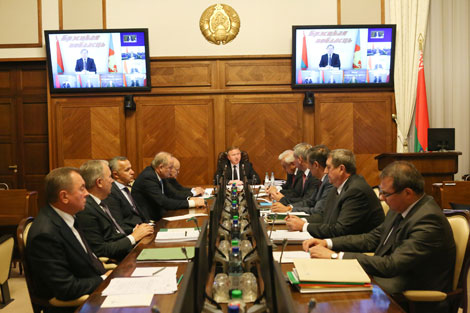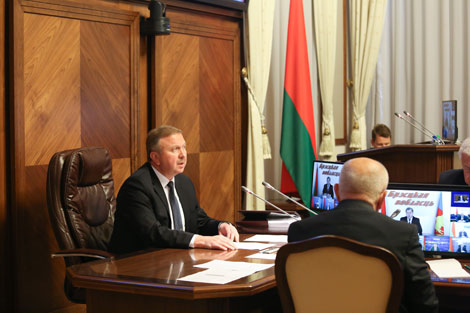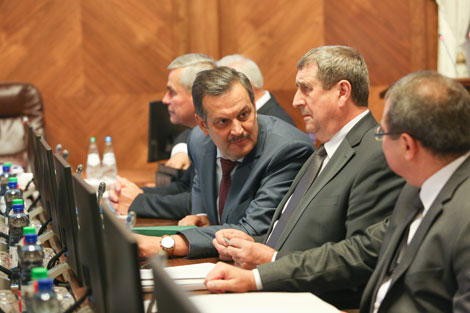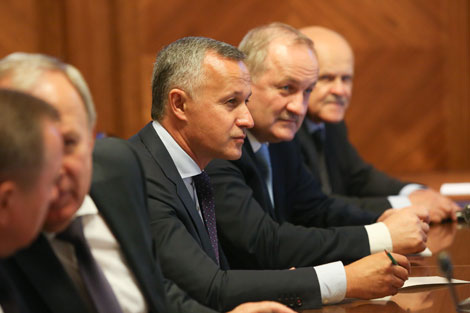Opinions & Interviews
Belarus’ GDP expected to grow by 3.4% in 2018

MINSK, 29 August (BelTA) – Belarus’ GDP is expected to grow by 3.4% in 2018, BelTA learned from Prime Minister of Belarus Andrei Kobyakov during the session of the Council of Ministers’ Presidium, which was held on 29 August to discuss the draft social and economic development forecast, the draft budget, and the draft major monetary management guidelines for the next year.
The long-range development documents are supposed to be ready today before being forwarded to the head of state. The entire package is to be forwarded for consideration of the head of state by 1 September.
 Two weeks ago the Council of Ministers’ Presidium considered and on the whole approved the draft presidential decrees on next year’s social and economic development tasks, the major monetary management guidelines, the bills on the central state budget, and amendments to the Budget Code and the Tax Code. All the issues raised during that session have since been looked into. A number of working meetings at the Finance Ministry and the Economy Ministry have been held. The prime minister has held several working meetings with representatives of the economic bloc of the government. Conceptual clauses of the draft social and economic development forecast, the draft budget, and the draft major monetary management guidelines were presented before the head of state one week ago. Andrei Kobyakov thanked members of the parliament for active participation in preparing the draft documents.
Two weeks ago the Council of Ministers’ Presidium considered and on the whole approved the draft presidential decrees on next year’s social and economic development tasks, the major monetary management guidelines, the bills on the central state budget, and amendments to the Budget Code and the Tax Code. All the issues raised during that session have since been looked into. A number of working meetings at the Finance Ministry and the Economy Ministry have been held. The prime minister has held several working meetings with representatives of the economic bloc of the government. Conceptual clauses of the draft social and economic development forecast, the draft budget, and the draft major monetary management guidelines were presented before the head of state one week ago. Andrei Kobyakov thanked members of the parliament for active participation in preparing the draft documents.
“Taking into account the crucial decisions made by the Council of Ministers’ Presidium on 16 August, I am told, today we have an understanding on the main issues, which were raised earlier. As far as the forecast documents are concerned, no serious changes have been introduced in comparison with what the Presidium looked at before. Two scenarios of development of the national economy depending on various external and internal conditions — a conservative one (for the budget) and a target-oriented one (for the social and economic development forecast) — still represent the foundation,” noted Andrei Kobyakov.
 In his words, the most important parameters of Belarus’ social and economic development forecast in 2018 have not changed. The GDP is expected to grow by 3.4%. Labor productivity is supposed to rise by 2.8%, with export of merchandise and services expected to grow by 6%. Foreign trade will be virtually balanced. With Belarus’ foreign trade at nearly $70 billion, the deficit is expected to be as low as $30 million or 0.1% of the GDP. Belarus intends to raise $1.45 billion in foreign direct investments. Inflation will not exceed 7% December against December while the average annual inflation will not exceed 7.4%. The real disposable income of Belarusians is expected to grow by 3.2% in 2018.
In his words, the most important parameters of Belarus’ social and economic development forecast in 2018 have not changed. The GDP is expected to grow by 3.4%. Labor productivity is supposed to rise by 2.8%, with export of merchandise and services expected to grow by 6%. Foreign trade will be virtually balanced. With Belarus’ foreign trade at nearly $70 billion, the deficit is expected to be as low as $30 million or 0.1% of the GDP. Belarus intends to raise $1.45 billion in foreign direct investments. Inflation will not exceed 7% December against December while the average annual inflation will not exceed 7.4%. The real disposable income of Belarusians is expected to grow by 3.2% in 2018.
The head of government pointed out that unlike forecasts of the previous few years the next year’s forecast expects the domestic demand to have a somewhat stronger effect on the GDP. “It is important to balance this factor with a commensurate contribution of the foreign trade to economic growth in order to avoid additional pressure on the balance of payments. The Economy Ministry believes that foreign markets will allow us to increase foreign currency proceeds by $2 billion in 2018. An increase in the actual volume of export will account for the bulk of the growth. I would like the Economy Ministry to comment on whether it is really feasible and how the task has been run by the ministries and the regions,” said Andrei Kobyakov.
 The prime minister concluded that the suggested forecast provides for balanced expansion of the economy without excessive pressure on the financial market and the foreign currency market. It is also important that the forecast document allows reaching the growth parameters specified by the five-year program.
The prime minister concluded that the suggested forecast provides for balanced expansion of the economy without excessive pressure on the financial market and the foreign currency market. It is also important that the forecast document allows reaching the growth parameters specified by the five-year program.
Oblast governors and ministers asked questions of principle concerning the use of the road fund, interbudget transfers, and export support. Andrei Kobyakov asked the finance minister to report what concerted decisions had been reached and what the draft budget provided for.
 According to the Finance Ministry, funding requests of several government agencies for about Br665 million remain unfulfilled. Andrei Kobyakov said: “I believe it is clear for everyone that we have to earn money and put it into the budget first and then distribute it. The budget will not allow spending in excess of revenues. This decision has been made by the Presidium. I would like you not to raise the matter again. The budget’s capabilities have a limit.”
According to the Finance Ministry, funding requests of several government agencies for about Br665 million remain unfulfilled. Andrei Kobyakov said: “I believe it is clear for everyone that we have to earn money and put it into the budget first and then distribute it. The budget will not allow spending in excess of revenues. This decision has been made by the Presidium. I would like you not to raise the matter again. The budget’s capabilities have a limit.”







 print version
print version make home page
make home page add to bookmarks
add to bookmarks

